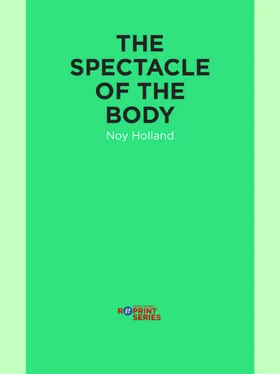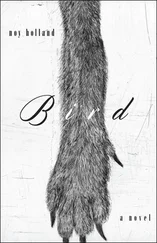I have got to cast out.
They are so near.
But Bingo is not with me. If Bingo does not look for me and Cissie does not look for me, since I have said to Cissie are we going to the fair?
I have got to paddle. But to paddle since I saw them near?
So I have got to lie here.
Maybe they are under here. I am not a scaredy. I am going to lie here. It is safe to lie here. I am sure to lie here that it is safe to lie here, that it is safe to listen at the skiff for the tick, for the slur they make, the barbed fast boil of the cottonmouths’ thick bodies.
In the morning, I see raincrows cawing in the trees. I have seven quarters, fourteen dimes, so many nickels yet to count and a dog’s tail in my pocket, pool to play in my pockets, since it is just the rough road nobody ever comes on much to climb out on from the hollow.
Sometimes if a car goes by, I think, Is that the car gone by unlighted, with its engine off if I am in the garden? Is Bingo in the garden? I watch for her in trucks gone by until one truck is a pick-’em-up truck that the fellows in it turn around and turn back around again to drive it out ahead of me to wait for me to follow. The one fellow says, All be , and the other one goes, Shew.
“All be,” the one says, “will ye look at them shoes?”
“Damned if it ain’t that scoundrel’s boy,” the other goes. “Shew.”
“Will ye look at them goddamn shoes?”
I have put my squeaky shoes to ride clean atop my pail until I near to town.
“How far is it to town?” I ask.
“Fur. Fur enough. Oh, fur.”
“What ye got shut in that bucket, boy?”
It is an old pick-‘em-up truck with dents and rust and muddy clumps and cans thrown back in the back of it, rattling tools and antlers, shot shells, I see, and leafy wads and the misspat spray of tobacco juice but: true. It is a far piece, true, by road or wood for a body to get to town.
“Cottonmouths,” I tell them.
“Cottonmouths? Shew.”
“Ain’t but two kind of snakes he’s afraid of. Live ones and dead ones.”
“You git back in the back then, boy. Shew.”
I put in my lidded pail, my stone for luck I have kicked from home, and before my legs are swung to clear the beaten-up sides of the bed of the truck, we are hell-bent howling down the road to rut and ruin by the last good trough of rain.
I keep my pail from tipping.
I catch my cap; I dust my shoes.
I am so lucky! By hoof bent and ailing truck, by day and dark, I’ll reach there.
What boy is this?
Buhl Parson’s boy!
Pray, boy. A peek, boy? What have you got in that bucket?
A hole, ma’am. A dancing toad. A six-legged armadillo.
Come riding, else walking, they come poor of shoe and pocket it is my good luck to fill — prayerful old disheartened hearts one and all for music come, for dancing and the girly sweet of candy in the air. For Clem come, always Clem, and for the carnies barking— A whale! A whale! The great white Clem! Harpooned in a covered truck they haul him fifty counties in.
Forty-nine foot long of him!
Nigh on seven tons of him!
None but a shoaty eye to show and nary a tooth nor tongue in him! A marvel! A wonder! An amazement to behold!
Come on, boy! Move on, miss! Come back, boy, he is smooth back here — I will let you hold him,
Yes, but mister, can you tell me this? Tell me how old Clem is. I want to know how old he is. Is he as old as that turtle is come flippered from the selfsame sea which he has got a glass trough of which we can see him swim in? Is he that old, your Clem? Is he?
Oh, move on. Will ye git on, boy. Go win yerself some gewgaws for your sister from the fair.
Here is what I figure — a quarter and two nickels which I will have to part with once to see Clem at the fair. Before, a peek inside my pail would set you back a nickel, but then was when I went the last with Daddy to the fair. I have seven quarters. Now if I charge a penny, five times is a nickel, so for five times two times, I can see Clem seven times for every ten lids seven times I lift up at the fair.
I put my hand against my throat so I can feel me say it— Clem, Clem.
Buhl Parson. Buhl Parson’s boy. Old Buhl Parson’s boy. Clem.
But by and by, we are bumping past where the road forks for the fair.
I knock my knuckles against the window. The one fellow rides with his head hung back to show the whisky slugs he takes that his long throat moves to swallow.
“Right-o,” he says. “Okeydoke. Hold yer horses, Slim.”
The truck shoots out underneath me. Broken jacks and rusty cans, headless screws and socket sets sail, skipping the ribby bed of the truck. I am flopped back, paddling for a hold to grab. I find my feet to stand up, and duck the limbs of roadside trees.
We are going faster. And we are getting farther.
So I have got to figure: tarsals and metatarsals, greensticks, spirals. Tibia, fibula, femur: there are two hundred and some-odd bones in the human body. Of these, I have broken eleven legs, thirteen arms, twenty-two toes and fingers.
I spy a string to make a splint with and slip it in my pocket. But then I see my pail. I see the fellow driving us, still driving us with his elbow bent to stick out his side window. So I figure. I turn my boy’s back on them so they can’t see me tip my pail, so they cannot see Oscar, so it is just my pail they see I swing outside the window of the one who goes shew .
“Shew,” he goes. “Shew, boy.”
I let my pail swing in at him, closer every time it takes for him to guess ahead and back again, back to the lucky fib again it has come to me I told him. Cottonmouths , I told him; we are proof of it — slung wheel-locked in a dusty skid I tip my cap at the finish of.
“I thank you, sir. And you, sir.” I hop down in my shiny shoes, with my turtle worked to my seat of my pants, to march — oh, slippery whelp! — the short piece to the overshot tin trumpet’s call to the fair.
Oh, Buhl’s boy, Buhl Parson’s boy.
So now I have my bucket. I have my yellow house I know, set back from a road I know, and if I walk to the back of the house, I see the rope, the pulley, the open mouth of thick pipe set in the drilled ground.
At the bottom of the pipe is a bucket.
I cannot see it. But I can say that it is filled.
The bucket Orbit leaves in the back of the truck, since I have said so, is empty. It is lidded. But — that drunken night or another, on some female curve or another on some hardscrabble county road — suppose that the bucket tips over. Suppose it is found tipped over.
There is a story I have often heard told in Tuscaloosa. There was a boy on a fishing boat on the lake near Tuscaloosa. I am not so sure it was August. It may be later, toward winter, the breeding season, when the nests are seen to rise in the lake and the eggs, it is said, of the cottonmouths are moving deep in their bodies. Onlookers on the banks of the lake claim the boy fell from the fishing boat. The boat was narrow, they say, not a deep boat, not a boat you would find to be hard to rock and, rocking, to get tipped over.
They dragged the lake there. It occurs to me to wonder why it is they dragged the lake there. Maybe it is something that must be done, that there is some sort of decree about, nothing you are left any choice about, but I am guessing that someone, some family one, thought it was something that should be done, that someone ought to take it upon himself to have the lake be dragged. And when he had, when the lake was dragged, when the body of the boy was on the bank you see the snakes sun on there, when it was seen there, when people gathered there to see it — the body, the boy it is said to have looked by then to have rolled down a hill as boys will do, but that this boy, punctured, spun out of a breeding nest, it is said that the way this boy looked, it was a long hill he had rolled down wrapped in barbed wire — then was the father, I wonder, was the sister, was whoever it was who decided for the boy, for the son, the brother, that he ought to be brought out of the lake and seen on the smooth bank there — were they, even then, that father, that sister, were they thinking ahead even then to how it might be told again, and knowing that it would be told again, how the story, the spectacle, the outrageous trick by common blood forevermore recast them?
Читать дальше











